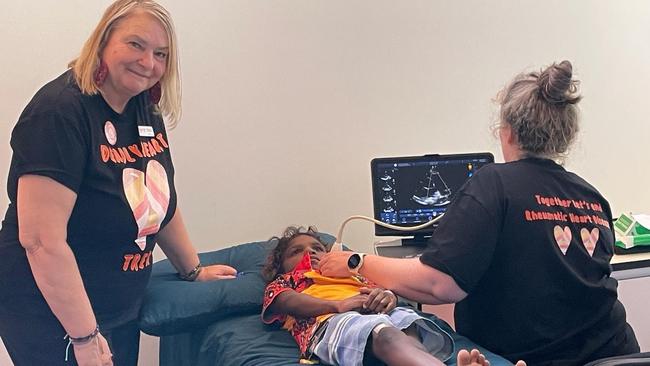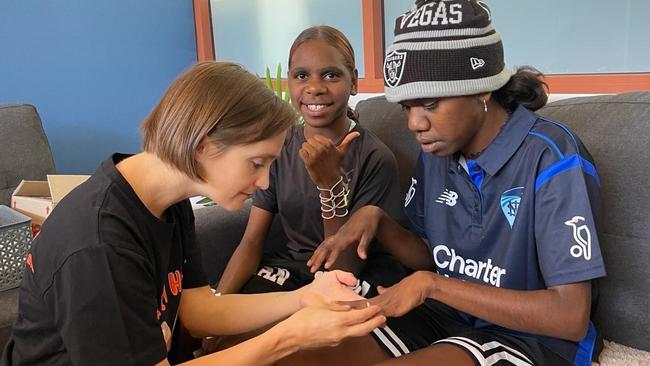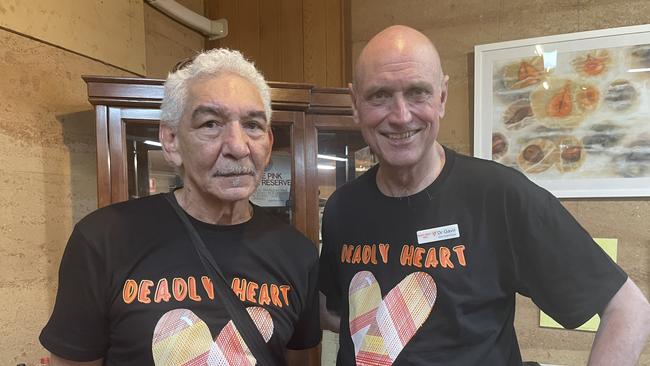Rheumatic heart disease tightens its grip on Alice Springs, leading to new Deadly Heart Trek visit
“A true disease of disadvantage”: A group of doctors, health workers and Aboriginal community leaders have returned to Alice Springs for the second time in as many years amid a worrying trend.

Northern Territory
Don't miss out on the headlines from Northern Territory. Followed categories will be added to My News.
A group of doctors, health workers and Aboriginal community leaders have returned to Alice Springs for the second time in as many years amid a worrying uptick in cases of rheumatic heart disease, the ultimate “disease of disadvantage”.
Rheumatic heart disease (RHD), which kills more than 288,000 globally per annum, according to the World Health Organisation, is caused by Streptococcus A bacteria, initially manifesting as acute rheumatic fever, before damaging the heart’s valves if untreated.
Of the approximately 10,000 Australians living with RDH or acute rheumatic fever, between 80–90 per cent are Aboriginal and Torres Strait Islander, and the majority of them are aged between 5–14.
Dr Gavin Wheaton, a pediatric cardiologist at Adelaide’s Women’s and Children’s Hospital who has been involved in the Deadly Heart Trek since its inception in 2021, said the multidisciplinary team has returned to Alice Springs because the township is ground zero of Australia’s fight against RHD.

“We wanted to come back to urban Alice Springs because the data in the last five years has suggested a significant problem with rheumatic fever,” Dr Wheaton said.
“Rheumatic fever is really a true disease of disadvantage.
“The disease has abated and largely disappeared in affluent communities, but in Australia and New Zealand, that has not been the case for the Indigenous populations.
“In [Australia], the disease now very much targets First Nations children and adolescents – there are other at-risk populations, migrants from African countries are also at increased risk, but it does remain a huge problem for First Nations people.

“We have some of the highest recorded incidences of rheumatic fever in the world.”
Of the 2700-plus echocardiograms performed during the Deadly Heart Trek, which has previously visited the Barkly, Thursday and Mornington islands, Doomadgee, APY lands and Central Australia, about five per cent have uncovered evidence of RHD.
Of those positive scans, about 66 per cent represent new cases.
The trek has two arrows in its quiver: education and treatment.
In addition to echocardiograms, clinicians perform hundreds of skin checks: scabies and impetigo are both harbingers of acute rheumatic fever, as they can be caused by Strep A.
By partnering with Aboriginal people and groups, such as the Central Australian Aboriginal Congress and the Tangentyere Council, the Deadly Heart Trek crew is able to hammer home the message that healthy skin equals healthy heart.
To this end, they also have in their arsenal a series of educational books co-developed with the Telethon Kids Institute, Gija Healthy Skin Story and Yara Yurtu Jarrja Ngarrmanu (Good Skin).
Arrernte man Greg McAdam, a cultural guide for the Deadly Heart Trek, said the success of multiple iterations of the trek “shows the importance of working with, and listening to, our people directly”.
“I would love our people to have more of an understanding of RHD, taught in a way our mob learns.
“The Trek is an example of action that works for us, respects our rights, recognises our unique culture, and involves us directly.”





